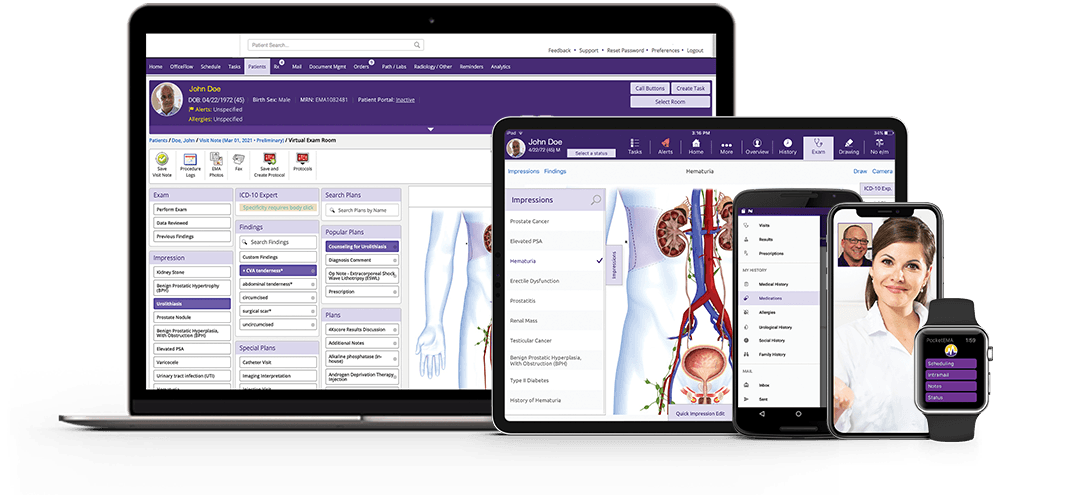How to Start a Urology Practice

Arrange financing, lease an office, choose tech, plan ops, attract patients and get credentials for your new urology practice
Today the trend is to consolidate medical practices, not to start new ones. Instead of dealing with the capital, management and other responsibilities required, you could accept a lucrative urologist position with a large firm or hospital. So, why go into business for yourself?
The potential for rewards: You like the independence and the opportunity to profit from your efforts. As the boss, you can mold a new urology practice in your own image. As an owner, you have a chance to do better when your business does better.
 First, of course, get some experience. Hone your skills. Residency is a good time to practice, and much of what you observe during residency is what you’ll encounter in your own practice — vasectomies, stone surgeries, benign prostatic hyperplasia, incontinence….
First, of course, get some experience. Hone your skills. Residency is a good time to practice, and much of what you observe during residency is what you’ll encounter in your own practice — vasectomies, stone surgeries, benign prostatic hyperplasia, incontinence….
Perfect your approach, learn from complications, gain confidence, and become efficient. Volume is a big factor in the success of a urology practice. When you’re ready to take the plunge, consider hiring a consultant who’s helped start medical practices before. Here’s a preview of what to expect.
In This Blog Post
How to Finance a New Urology Practice
Office for a Urology Practice
Urology EHR and Other Technology
Operations Plan for a Urology Practice
Marketing a Urology Practice
Credentialing a Urology Practice
Government Affairs for a Urology Practice
How to Finance a New Urology Practice
Financing a new urology practice starts with a strategic plan. Think of it as a road map, but remember, there will be detours along the way. Describe your mission, vision, values and goals. Define the objectives and actions needed to achieve them. Do a market analysis and outline a marketing plan.
 Budget. Make a start-up budget for your consulting, legal, accounting and other one-time costs. Make an operating budget to project your revenue and expenses and to measure performance. Feel free to update the budget along the way.
Budget. Make a start-up budget for your consulting, legal, accounting and other one-time costs. Make an operating budget to project your revenue and expenses and to measure performance. Feel free to update the budget along the way.
Cash Flow. Remember to plan for the cash flow issues that result from expansions, dips in volume, lags in reimbursements and write-offs. Consider software and systems that can help you solve billing challenges and gain transparency.
Starting. Rather than starting from scratch, consider buying into an existing practice or taking over from a retiring urologist. Find an accounting firm with medical practice experience to guide you.
Credit. You may want to pay off any med school debt before borrowing for a practice. If you don’t have $100,000 ready to invest and another $100,000 in a line of credit, you’ll want to develop a relationship with a bank that has medical practice experience. Some banks even have medical divisions. Shop your business plan to several banks and remember the US Small Business Administration, which backs loans to medical practices.
Capital. Request what you need, no more or less, since a conservative request has a better chance of approval. Put off those state-of-the-art gadgets you’d kinda’ like to have. Consider buying used and look for other ways to reduce capital needs. For example, an online platform for electronic health records, practice management and other software tools saves you the considerable expense of a server in your office.
Insurance. Don’t forget insurance. Products range from good ideas to must haves:
- Malpractice insurance helps protect urologists against lawsuits alleging negligence.
- Liability insurance helps protect against claims for injuries on your property.
- Contents insurance reimburses the firm for theft or damage to property.
- Business interruption insurance replaces income lost due to disasters.
- Health insurance covers you and your employees for medical expenses.
- Disability insurance covers employees for loss of income due to illness or injury.
- Life insurance pays beneficiaries in case an insured employee dies.
- Workers’ compensation helps employees who are injured or sickened on the job.
- An employee fidelity bond helps protect the practice against misdeeds by staff.
- Corporate insurance helps protect against unforeseen circumstances.
- An umbrella policy provides added coverage against lawsuits for damages or injury.
Office for a Urology Practice
 Find office space near your patient base and consider medical clusters near hospitals to take advantage of potential synergies. To avoid unnecessary build-out costs, choose existing clinical space, perhaps a suite being vacated by a retiring urologist.
Find office space near your patient base and consider medical clusters near hospitals to take advantage of potential synergies. To avoid unnecessary build-out costs, choose existing clinical space, perhaps a suite being vacated by a retiring urologist.
Moving In. Purchase furnishings, signage and supplies, and contract for janitorial and maintenance services. Consider moving in with other physicians in similar or complementary specialties to share expenses.
Turning Up. Order electrical and water services if they’re not included with your space, and don’t forget all the inspections, permits and certificates your state and municipality may require — fire, safety, occupancy….
Urology EHR and Other Technology
Choose your technology carefully, since it will have a big impact on everyone’s productivity. Start with internet access — the broader the broadband the better — plus workstations, tablets, and telephone hardware and services.
 All in One. Instead of the one-size-fits-all software you may have used in hospitals, you’ll want a urology-specific system for your electronic health records. Instead of bridging programs or duplicating data entry, you’ll want the practice management, billing and patient engagement software to be integrated with the urology EHR.
All in One. Instead of the one-size-fits-all software you may have used in hospitals, you’ll want a urology-specific system for your electronic health records. Instead of bridging programs or duplicating data entry, you’ll want the practice management, billing and patient engagement software to be integrated with the urology EHR.
Efficiency. That way, you can reduce retyping and other redundancies — as well the errors that often result — and you can take advantage of automations for even greater efficiencies. Don’t forget the payment processing. You’ll want payments to interface neatly with your other systems.
Scalability. Cloud-based platforms make all of these functions faster to get up and running and easier to scale as your practice grows.
Coding. Once upon a time, you needed coding staff and manuals — CPT, HCPCS, ICD — to get paid by insurance companies and government programs. Today, the selection of codes and modifiers can affect reimbursements significantly, and some EHR systems come with codes built in. They even suggest codes based on your diagnoses and treatment plans.
ModMed®. According to Black Book™ Research, cloud-based ModMed Urology is the #1 EHR system. With deep urological content built in, it was designed by urologists to save themselves time while documenting exams.
Operations Plan for a Urology Practice
While creating an operations plan to start a urology practice, remember that not every function needs to be staffed internally. Practices often outsource billing and benefits administration.
![]() Staffing. Good staffing is critical to the success of a new urology practice, and skimping on staff can be costly in the end. You’ll need people to cover administration, reception, scheduling and clinical operations. Write job descriptions for your new hires, order background checks (criminal history, licenses, credentials), and create an employee handbook that covers policies, procedures, benefits and training.
Staffing. Good staffing is critical to the success of a new urology practice, and skimping on staff can be costly in the end. You’ll need people to cover administration, reception, scheduling and clinical operations. Write job descriptions for your new hires, order background checks (criminal history, licenses, credentials), and create an employee handbook that covers policies, procedures, benefits and training.
Associations. To keep abreast of evolving legal issues, regulatory requirements, medical ethics and clinical developments, while supporting industry advocacy, you may want to join professional associations such as the American Medical Association, American Urological Association, and local groups.
Contracting. Remember to contract for laboratory services, medical waste disposal, document destruction and payroll services.
Productivity. To save on payroll, take advantage of automated systems wherever possible, like cloud-based patient engagement tools for self-scheduling, appointment reminders, telehealth and payments. ModMed offers robust software for all these functions, helping you empower patients while reducing staff time.
Marketing a Urology Practice
In smaller cities, the shortage of urologists may help you get started. In a competitive market, however, you’ll have to work hard for referrals. Patients don’t just show up.
Visibility. In any market, you should get out there, shake hands, kiss babies, and make yourself visible. Meet your local hospital administrators and develop some rapport. They can be good sources of referrals, especially if you perform a specialized procedure. Apply for your hospital privileges.
Meeting and Greeting. Get to know the nurses in the ORs and on the floors. Visit local urgent care centers, give people your cell number, and offer to help at odd hours. They’ll appreciate the resource and think of you for referrals. Make a list of primary care providers in your vicinity and go meet them. In the early days, you’ll have time.
 -Media. Brand yourself. Get to know social media and use it to your advantage. You don’t have to learn it all yourself. There are firms that specialize in medical practice marketing.
-Media. Brand yourself. Get to know social media and use it to your advantage. You don’t have to learn it all yourself. There are firms that specialize in medical practice marketing.
Creative Content. Make Facebook and Instagram pages and a blog. Create new content constantly. A steady stream of content informs potential patients and referral sources, keeps you at top of mind, and attracts the search engines.
Search. Create a website and register it with the major search engines. Pay attention to your profiles on WebMD, Vitals, RateMDs, HealthGrades and Yelp! Run some small, targeted campaigns. Good reviews are important, so invite your best patients to submit online reviews.
Community. Join chambers of commerce and local business organizations, participate in them, and keep in touch with your mentors.
Credentialing a Urology Practice
To get paid by private and government insurance programs, you’ll need credentials. Start the credentialing process sooner rather than later, because it can take months. Payers will inquire about your medical education, residency, license and insurance — some states require malpractice insurance.
 Private Payers. Find out which health insurance carriers operate in your state and negotiate reimbursement contracts with each.
Private Payers. Find out which health insurance carriers operate in your state and negotiate reimbursement contracts with each.
Medicare and Medicaid. Urologists can enroll on the Centers for Medicare & Medicaid Services website, and if you plan to serve low-income or elderly patients, you’ll want to be part of your state’s Medicaid program. For Medicare, the Merit-Based Incentive Payment System affects reimbursements, but software can assist with submissions.
Government Affairs for a Urology Practice
Your healthcare attorney can advise you on a legal structure and draft your articles of incorporation, articles of organization or partnership agreement. That structure will affect your liability for taxes, lawsuits, debts and losses.
Taxability. As a C corporation, popular with larger entities, the business pays tax on its net income, and the owners pay tax on theirs. As an S corporation, popular with smaller firms, the business income flows to the owners to be taxed together.
Tax IDs. Apply to the Internal Revenue Service for a Federal Employer ID, which identifies your business for tax purposes. You may also need a state employer ID and state sales tax ID. You’ll probably need a business or occupational license from your local municipality.
Medical IDs. Physicians need National Provider Identifiers from the CMS National Plan and Provider Enumeration System to identify themselves in a standardized way. To prescribe medications, you’ll need a DEA number from the Drug Enforcement Administration, and you may need a license from the medical board in your state.
 Equipment. If you have X-ray equipment, you may need to register it with your state health department. If you have a laboratory, you’ll need certification from the Clinical Laboratories Improvement Amendment program through CMS.
Equipment. If you have X-ray equipment, you may need to register it with your state health department. If you have a laboratory, you’ll need certification from the Clinical Laboratories Improvement Amendment program through CMS.
Regulations. Finally, familiarize yourself with requirements of the Occupational Safety and Health Administration, Physician Self-Referral Law, Health Insurance Portability and Accountability Act, and Universal Protocol training.
Sources
“Checklist for New Practice Start – Up,” MGMA Health Care Consulting Group (2000) www.thepracticeresource.com/tools/new-practice.pdf
“New PracticeStart-Up Checklist,” Kareo (2020) hub.kareo.com/kareo-new-practice/new-practice-start-up-checklist
R. Rohit Dhir, “5 Things I Wish I Knew Before I Started My Career in Urology,” The Scope of Practice blog (2021 January 21) www.thescopeofpractice.com/5-things-i-wish-i-knew-before-i-started-my-career-in-urology
This blog is intended for informational purposes only and does not constitute legal or medical advice. Please consult with your legal counsel and other qualified advisors to ensure compliance with applicable laws, regulations and standards.




